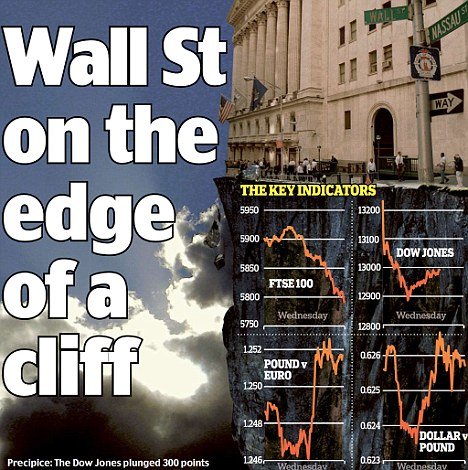
New York stocks on Wednesday night took fright at the outcome of the American presidential election as the world braced itself for prolonged and difficult negotiations over the US budget deficit and debt levels.
Despite all the discussion of a bipartisan approach to tackling the US’s $1trillion a year budget deficit, investors fear that President Barack Obama will face a renewed struggle reaching an agreement with Congress by the deadline for the “fiscal cliff” of January 1st, 2013.
Failure to meet that deadline, enshrined in law, would mean that automatic budget cuts and tax rises would come into effect taking $600 billion out of the economy and sending America and much of the rest of the world back into recession.
In trading on Wall Street, the Dow Jones Industrial Average plunged from the opening bell and by mid-afternoon was showing a loss of 300 points or 2.24% the biggest single day fall in 2012 and the largest loss since November 2011. It closed down 312.95 points at 12932.73.
Disquiet about the outcome of the election and its impact on the rest of the world triggered a worldwide reaction with the FTSE 100 index plunging in its wake by 1.58%.
The overall mood on the markets was not assisted by fears of a deep slowdown in Europe and further troubles on the streets of Athens as Greek parliament met to approve a new fiscal package.
Among the biggest fallers on Wall Street were banking shares with JP Morgan, Citibank, Bank of America and Morgan Stanley suffering big setbacks. Although New York state was a solid Democratic win in the election, the banks were big financial backers of Mitt Romney in the hope he might ease some of the onerous regulation imposed since the Great Panic of 2008 if he won.
Matters were not helped by the intervention of Goldman Sachs that has lowered its forecast for American growth next year from 1.9% to 1.5%, barely enough to lower unemployment from its current level of 7.9% of the workforce.
In contrast to share prices, however, the dollar advanced against both the pound and the euro as part of the flight to safety, including American bonds, by international investors.
In times of uncertainty investors traditionally move away from risky assets like shares and opt for hard currencies and bonds. The pound was trading last night at just below the $1.60 level at $1.5986.

A big concern on financial markets is that the credit rating agencies will decide to follow the actions of Standard & Poor’s in August 2011 – when the last budget negotiations were in full flow – and remove the AAA credit rating enjoyed by the US.
In a note Fitch said the President would need to quickly secure a deal with Congress to avoid the fiscal cliff and raise the debt ceiling – the total amount of debt that the US can issue – if a ratings downgrade was to be avoided. America has among the highest debt levels in the Western world at 107% of gross domestic product according to the International Monetary Fund.
The fear is that unless Congress and the White House can deal with the fiscal deadlock before January 1st, 2013, then the automatic cuts would immediately trigger a recession potentially wiping as much as 2.5% of output and leading to a sharp rise in the jobless rate.
There had been hopes the election would cleanse the poison in US politics that has held up budget negotiations. In reality nothing has changed in that a Democratic president still has to deal with a hostile House where the Tea Party extremists still hold some sway.
They believe that the US’s budget problems would be solved by cutting welfare payments and keeping taxes low.
Another credit rating agency, Moody’s, said it would not be changing its assessment of the US economy until after the deadline for the fiscal cliff had passed.